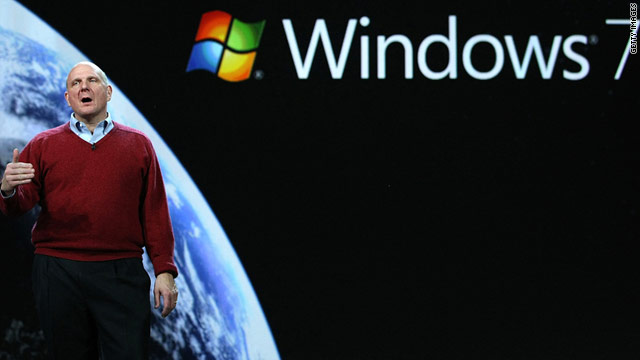So it's a bit like dèja vu reading in The New York Times that Ballmer is taking the stage to talk slates again. Mind you, this time he's going to show off not just one Windows 7 slate, but several, according to NYT's Nick Bilton.
But increasing the device count isn't going to make a Windows 7 slate any better. Here are seven reasons buying a Windows 7 slate would be a bad idea:
Windows is not for fingers
Windows 7 is designed for desktop computing, not multitouch tablets. Dragging around windows to switch between applications is not the kind of thing you'd do on a tablet. It's why we use keyboards and mice.
At CES 2010 there were a few pilot tablets running Windows 7. They were difficult to use, because the Windows 7 interface on a tablet was an ergonomic nightmare. Scrolling was laggy, and some devices we tested even froze while we were shooting video demonstrating the products.
Even with a touch-friendly skin on top, there are still going to be times when you wish you had a mouse -- like when a dialog box pops up that hasn't been optimized for touch, and its control buttons are too tiny for your fat digits.
Windows is too bloated for mobile devices
Windows 7 is a big improvement over Vista and XP, but it's still got a lot of the same Windows headaches. Plug in a peripheral, for example, and Windows 7 has to search a sluggish database for a device driver.
The idea behind a mobile device is that you're on the go and you need apps that keep in pace with your movement, and Windows just isn't optimized for that.
On top of that, the power management is not designed for an always-on, carry-everywhere experience.
For a tablet competitive with the iPad you need an OS with extremely fast boot times that can run on low power for epically long hours, and Windows 7 has neither of those features. (The iPad, for instance, has a standby battery life of 30 days.)
There will be too many unpredictable variations
Microsoft's modus operandi with Windows is to license the OS to any manufacturer that wants it, and the OEMs ship Windows notebooks with their own custom software (aka bloatware).
There are a thousand different variations on keyboards, controls, aspect ratios and more. The same would happen with tablets. By contrast, Android and iOS have more-or-less predictable hardware, something that Microsoft itself recognized was important in Windows Phone 7, its mobile OS.
You'll have to maintain it like a Windows machine
Windows has always been a prime target for the authors of viruses and botnets because of its gigantic userbase. On a Windows 7 tablet you'd have to install antivirus software, which would inevitably affect battery life and overall performance.
Then you'd probably want to install memory-optimizing utilities, a better disk defragmenter, and maybe a registry cleaner. After a year it would start slowing down like Windows machines always do, and you'd have to do a clean install of the OS.
In short, a Windows tablet would give PC users lots of flexibility -- but it would be antithetical to the experience of an easy-to-use consumer device that you don't have to maintain.
There is no Windows 7 app store
Microsoft's Windows 7 doesn't have a friction-free app store like Google or Apple have on their mobile OSes. So what would you do with the multitouch gestures of a Windows 7 tablet that differs from the everyday desktop computing experience? There'd be no practical purpose in having a Windows 7 tablet if it's just going to run desktop software.
Microsoft has tried this before, and it didn't work
Remember the Tablet PC (introduced by Bill Gates in 2000, pictured above)? Sure, if you were one of the minority of people who were willing to put up with a stylus-driven version of Windows, it was fine. There are even a few machines like this still out there.
But there's a reason that the Tablet PC never took off among mainstream users, despite a decade of effort on Microsoft's part: It was basically just a variation on Windows, and there was never a compelling reason for most people to add touchscreen controls to the basic Windows experience.
Windows does what it does very well. But it's not a tablet OS.
Microsoft probably has something better planned
Microsoft has invested millions of dollars in hiring new staff and building new lab facilities to create Windows Phone 7. It has completely rebooted its mobile strategy, attempting to learn from its past mistakes with Windows Mobile.
Why would the software giant invest much into turning Windows 7 into a tablet OS rather than expand its phone OS for tablet use, the way other companies are already doing?
We're betting Microsoft already has plans to build a tablet OS based on Windows Phone 7, not Windows 7, and that the desktop-OS--based tablets are just a stopgap until that effort's ready. If a Windows 7 tablet became available in January, it seems like it'd be an unwise decision to buy one.

No comments:
Post a Comment